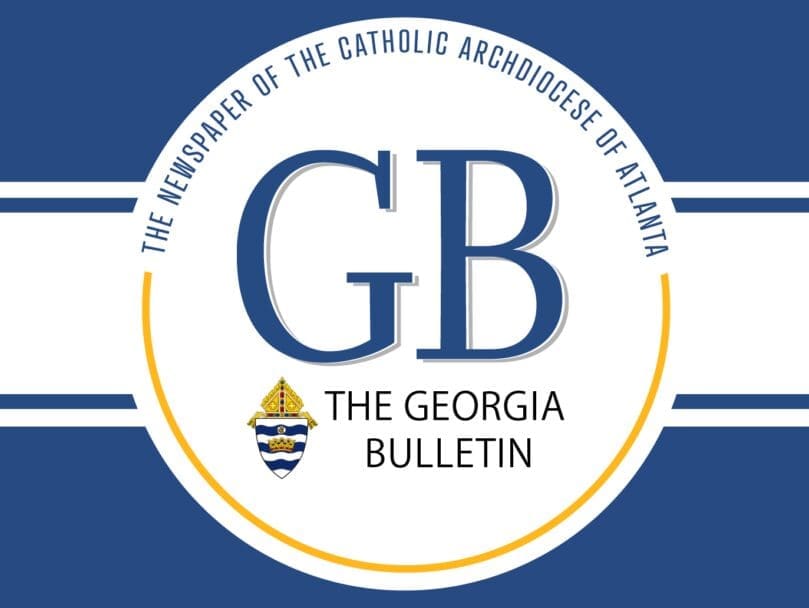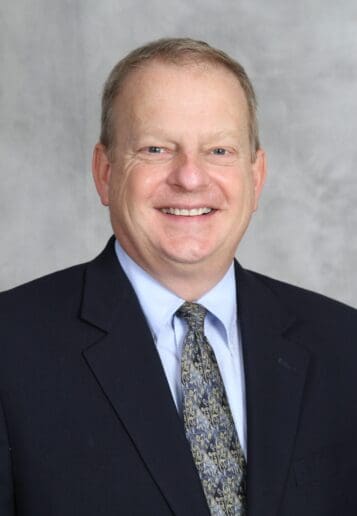
Atlanta
Chief operating officer departs for Archdiocese of Washington
By ANDREW NELSON, Staff Writer | Published March 31, 2022
ATLANTA—David Spotanski, who was named the first lay chief operating officer in the Archdiocese of Atlanta in 2013, says the “vitality” of faith lived in the 69 counties and more than 100 parishes and missions of the archdiocese makes it unique.
“The church in the Southeast is unlike just about any other region in the United States. We’re still growing and building—most places are not,” he said.

David Spotanski, who served as the first lay chief operating office of the Archdiocese of Atlanta, departed for service in Archdiocese of Washington. Photo by Michael Alexander
Spotanski is leaving his position at the archdiocesan Chancery in Smyrna to take up a similar role for the Archdiocese of Washington, joining the leadership team of Cardinal Wilton D. Gregory. He and his wife, Sharon, have three grown children and two grandchildren.
Spotanski, 59, has spent close to three dozen years working in church administration. He arrived in Atlanta in 2012 as the director of stewardship. He has a long working relationship with Cardinal Gregory, beginning when the cardinal was the bishop of Belleville, Illinois.
While in Belleville, Spotanski read aloud a letter, penned from his perspective as a parent, during the height of the clergy sex abuse scandal to then-Bishop Gregory. The bishop was serving as president of the U.S. Conference of Catholic Bishops at the time and was pivotal in guiding the response to the crisis.
Spotanski was one of Cardinal Gregory’s key staff members a decade ago when the then-Atlanta archbishop reorganized Chancery administration. His last day was Wednesday, March 30.
The Georgia Bulletin conducted a final interview with Spotanski prior to his departure. Below are responses edited for length:
You served as the first lay chief operating officer of the Atlanta Archdiocese. What have you learned about the value of having lay voices at the table when decisions are made about the governance of the church?
I’ve worked in three dioceses over 35 years, long before the term “lay ecclesial minister” ever entered the vernacular. I’ve been blessed to witness firsthand the inspired and necessary evolution of lay involvement in the church’s decision making. Even in my earliest days, I felt welcomed and appreciated at the table where those conversations were taking place. The Synod on Synodality is an amazing culmination of that evolution.
Looking back to your time in the archdiocese, what is a success you are proud of?
I’m proud of a number of things we’ve accomplished since I’ve been here, but I can’t take credit for any of them—the Special Projects initiative that provided larger, more appropriate worship sites in missions and parishes with sustained overcrowding and few resources of their own; the Laudato Sí Care for Creation project; the ongoing synod listening sessions and discernment. Those are all the work of dedicated staff and volunteers that coalesced into “church being church,” which is literally why we’re all here. I’m just glad I got to be a part of them.
You will move to Washington, D.C., to work again alongside Cardinal Wilton D. Gregory, the former archbishop here. What will your role be, and what appealed for you to move?
I will serve the cardinal and the archdiocese as chief operating officer, much as I did here.
I first went to work for then-Bishop Gregory in 1994, about six months after he arrived in the Diocese of Belleville, Illinois. I joined his staff here in 2013. My respect for Cardinal Gregory and his leadership has only grown over time. When he invited me to round out our long collaboration in Washington, despite the affection we’ve developed for the Catholic Church in north Georgia, Sharon and I prayed about it and knew it was the next thing God wanted us to do.
You arrived in 2013 in the South as a Midwesterner, by way of central New York. How has your experience here shaped your faith? As you leave, what is a memory you take with you?
The church in the Southeast is unlike just about any other region in the United States. We’re still growing and building—most places are not. We have more priests than we had 10, 20 or 30 years ago—most places have a quarter to a third as many. The vitality has definitely rubbed off on me. Don’t ever take for granted the graced time and place in which you live your faith.
I’ll never forget the people I’ve come to know and respect here—my friends and colleagues; these three remarkable bishops; the faithful, especially the volunteers who serve on our boards and committees; the pastors and deacons. I’ve been to 10 regional synod listening sessions all over the archdiocese in the past few weeks. Visiting the parishes and being in the company of so many Catholics who love their church so dearly has turned into an incredible and providential way to round out my time here. In retrospect, I wouldn’t have missed it for the world.
Thanks, everyone. May God continue to bless you all.